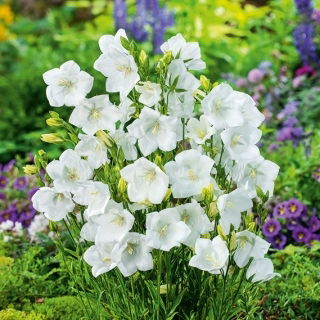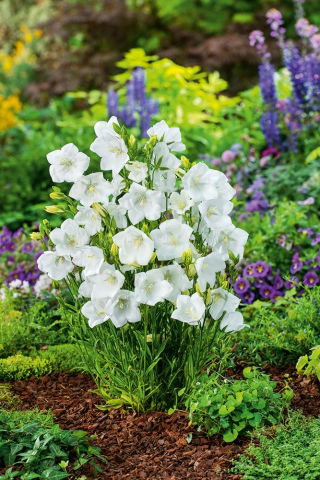The Peach-leaved Bellflower, known by its Latin name Campanula persicifolia, is a unique perennial plant that adds charm to any garden. Its white, bell-shaped flowers gathered in impressive clusters catch the eye and create a romantic atmosphere. This plant forms clumps of upright stems reaching heights of 70-100 cm, making it ideal for perennial borders and as cut flowers for bouquets. The Peach-leaved Bellflower is gaining increasing popularity among gardeners due to its allure and ease of cultivation.
Sowing
The Peach-leaved Bellflower can be sown both under cover and directly into the ground, although there is no data on the latter method. The plant does not require special conditions, but maintaining appropriate soil moisture is advisable to ensure successful germination.
Sowing Depth
Sow the Peach-leaved Bellflower seeds at a depth of approximately 0.3 cm. This depth provides optimal conditions for germination, protecting the seeds from drying out and allowing the roots to spread evenly.
Sowing Period Under Cover
When should you sow the Peach-leaved Bellflower seeds under cover? The best time for sowing under cover is from April to June. During this period, it is important to ensure appropriate temperature and moisture levels for rapid seed development.
Planting Time
The best time to plant the Peach-leaved Bellflower is in September. This allows the plant to establish well before winter, increasing its chances for abundant flowering in the next season.
Plant Spacing
When planning the arrangement of Peach-leaved Bellflowers in the garden, maintain a spacing of 30x40 cm. This ensures that the plants have enough space to grow, and their flowers can display their full splendour.
Companion Planting
The Peach-leaved Bellflower pairs beautifully with other perennials with similar requirements, such as delphiniums or dianthus. Combined plantings with these plants create a harmonious composition in the garden.
Site Conditions
This plant grows best in sunny or semi-shaded locations. The ideal soil is well-drained, moderately moist, and fertile. While the Peach-leaved Bellflower tolerates a range of conditions, regular watering during dry spells is beneficial. The soil should also be well-drained to prevent waterlogging, which can lead to root rot.
Growing Tips
The cultivation of the Peach-leaved Bellflower is straightforward. This plant requires regular watering, especially during dry periods. Fertilisation in early spring is recommended to support growth and flowering. Deadheading faded flower clusters stimulates further blooming and helps maintain the plant's aesthetic appearance.
Plant Height
The Peach-leaved Bellflower reaches a height of 70-100 cm. This makes it an excellent choice for the upper layer in perennial borders, adding structure and elegance.
Flowering Period
The Peach-leaved Bellflower blooms from June to July. During this time, its white flowers are a true garden adornment, drawing attention and enhancing any arrangement.
Usage
The Peach-leaved Bellflower is perfect for perennial borders, where it can serve as a focal point. Its flowers are also excellent for cut arrangements, retaining freshness for a long time in a vase. This versatile plant is easy to arrange, making it a popular choice for home gardens and floral compositions.
Resistance to Diseases
The Peach-leaved Bellflower is characterised by good disease resistance, making it an easy-to-grow and reliable garden feature. As a result, it does not require intensive use of plant protection products.
Good to Know
The Peach-leaved Bellflower easily adapts to various growing conditions and is frost-resistant, meaning it will survive the winter without additional protection. However, remember that trimming faded flowers not only prolongs the blooming period but also contributes to healthier plant growth. This bellflower is also attractive to pollinating insects, which can help increase biodiversity in your garden.
Why Buy from Garden Seeds Market
Purchasing seeds from Garden Seeds Market guarantees high quality and satisfaction. Our seeds undergo rigorous laboratory testing to ensure excellent germination. With our swift delivery system, orders reach customers quickly, and positive customer reviews attest to the reliability of our services. Garden Seeds Market also offers attractive promotions and expert advice on plant cultivation, making shopping with us a pleasure and a secure investment.
The packet contains 0.2 g of seeds. The packaging includes information on cultivation guidelines and the sowing expiry date.






